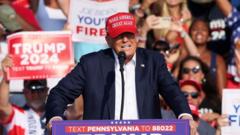With rising tensions and domestic issues, candidates are navigating a complex relationship influenced by global dynamics.
**Trump's Influence Shapes Australia’s Political Landscape Ahead of Election**

**Trump's Influence Shapes Australia’s Political Landscape Ahead of Election**
As Australia prepares for its upcoming election, the impact of Donald Trump is felt throughout the campaign.
In Western Sydney, the scene is a lively rodeo, with locals dressed in Stetson hats enjoying typical fair foods like 'chip on a stick', a testament to the deep cultural ties between Australia and Americana. Yet, this rodeo atmosphere amplifies the clash of politics as Australia gears up for a federal election amidst global uncertainties and Donald Trump's controversial presidency that looms large over electoral discussions.
While Trump impacts the campaign, many Australians reflect a sense of detachment from his policies, with some expressing trust in their own political leaders. "It’s all a bit of a show," says Jared Harris, a local rodeo-goer who admits world events affect him but chooses to remain indifferent. However, political figures—like Prime Minister Anthony Albanese—face pressure as they articulate Australia's foreign policy stance amidst Trump's often unpredictable decisions. Albanese criticized Trump's tariffs as "not the act of a friend," and has opted not to retaliate, further complicating the political landscape.
As the election date of May 3 approaches, candidates, particularly Albanese of the Labor Party and the Coalition’s Peter Dutton, focus on domestic issues such as healthcare and cost-of-living. Yet, the unpredictable nature of U.S. politics represents an underlying concern, forcing Australian leaders to reassess their alliance with the United States. Recent polls depicted a shift in favor of the Labor Party, signaling that Albanese’s strategies may be resonating with voters seeking stability against a backdrop of global chaos.
Polls suggest a growing sentiment among Australians regarding Trump’s influence, with dissatisfaction climbing to 60%. While a close defense relationship through pacts like Aukus and Five Eyes has long been a cornerstone of Australian politics, Trump's tariffs challenge this alliance. With concerns over rising Chinese military presence and their implications, Australia's need for a strong ally becomes even more pronounced.
In the lead-up to the election, candidates face pointed questions about their approaches to U.S.-Australia relations, with the electorate showing desire for leaders who assert their national interests while engaging with unpredictable global leaders like Trump. While Dutton previously aimed to align himself with Trump, shifting political sentiments indicate that Australian voters may prefer a leader who prioritizes standing up to rather than befriending him.
Analysis suggests that Trump's presence could inadvertently bolster Albanese's position, rallying voters around him amid perceived national threats. The outcome remains uncertain, but there is a recognizable trajectory toward Albanese gaining support as Australians seek reassurance during turbulent times.
As the sun sets at the rodeo and anticipation builds for the bronco rides, Australian voters are left reflecting on how their next political leader will navigate both local challenges and the complexities of international relations in a world heavily influenced by Trump’s leadership style. Each candidate’s ability to manage this evolving narrative will be crucial as the election approaches, emphasizing the difficulty of riding through such an unpredictable political storm.
While Trump impacts the campaign, many Australians reflect a sense of detachment from his policies, with some expressing trust in their own political leaders. "It’s all a bit of a show," says Jared Harris, a local rodeo-goer who admits world events affect him but chooses to remain indifferent. However, political figures—like Prime Minister Anthony Albanese—face pressure as they articulate Australia's foreign policy stance amidst Trump's often unpredictable decisions. Albanese criticized Trump's tariffs as "not the act of a friend," and has opted not to retaliate, further complicating the political landscape.
As the election date of May 3 approaches, candidates, particularly Albanese of the Labor Party and the Coalition’s Peter Dutton, focus on domestic issues such as healthcare and cost-of-living. Yet, the unpredictable nature of U.S. politics represents an underlying concern, forcing Australian leaders to reassess their alliance with the United States. Recent polls depicted a shift in favor of the Labor Party, signaling that Albanese’s strategies may be resonating with voters seeking stability against a backdrop of global chaos.
Polls suggest a growing sentiment among Australians regarding Trump’s influence, with dissatisfaction climbing to 60%. While a close defense relationship through pacts like Aukus and Five Eyes has long been a cornerstone of Australian politics, Trump's tariffs challenge this alliance. With concerns over rising Chinese military presence and their implications, Australia's need for a strong ally becomes even more pronounced.
In the lead-up to the election, candidates face pointed questions about their approaches to U.S.-Australia relations, with the electorate showing desire for leaders who assert their national interests while engaging with unpredictable global leaders like Trump. While Dutton previously aimed to align himself with Trump, shifting political sentiments indicate that Australian voters may prefer a leader who prioritizes standing up to rather than befriending him.
Analysis suggests that Trump's presence could inadvertently bolster Albanese's position, rallying voters around him amid perceived national threats. The outcome remains uncertain, but there is a recognizable trajectory toward Albanese gaining support as Australians seek reassurance during turbulent times.
As the sun sets at the rodeo and anticipation builds for the bronco rides, Australian voters are left reflecting on how their next political leader will navigate both local challenges and the complexities of international relations in a world heavily influenced by Trump’s leadership style. Each candidate’s ability to manage this evolving narrative will be crucial as the election approaches, emphasizing the difficulty of riding through such an unpredictable political storm.




















